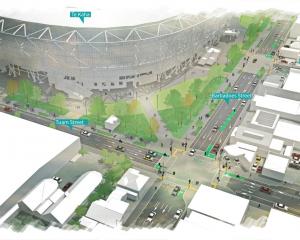
Corelogic's House Price Index fell 0.9 per cent last month as the downturn in the property market became further entrenched.
The drop of 2.5 per cent for the past three months was the largest quarterly fall since the GFC.
Prices fell in each of the six main centres and previously resilient Christchurch joined the negative trend in other major cities.
Prices in the Garden City were down 1.6 per cent last month, while Wellington posted the biggest monthly fall of 3.6 per cent in July.
Corelogic NZ head of research Nick Goodall said despite the steep decline in prices, a property crash was not on his radar.
Goodall was not surprised Christchurch joined the other main centres as the market flattened.
"Supportive factors such as better affordability in Christchurch may mean values and demand hold up better than other main centres but that doesn't mean Christchurch will be immune from the downturn," he said.
Despite the fall in house prices, Goodall said it was still challenging for buyers to enter the market.
"Housing affordability remains significantly stretched despite values falling, with the combination of high prices, following a significant upswing in values, and increasing interest rates restricting the number of buyers who are able, let alone willing, to borrow the sums of money required to buy property," he said.
Real estate agent Richard Withy from Ray White Metro was not surprised values in Christchurch had dropped, but business was still brisk.
“We see it first hand, we see the buying sentiment and the attitude. It’s also cyclical. If you look back over the last few property cycles it tends to follow a fairly similar pattern,” he said.
“Good properties in any market still sell and have good demand due to the old adage: ‘Location, location location’.
“Good properties are always hard to find but in the last two or three weeks there’s been a bit of a shift in momentum.
“There's always a bit of buyer push back after a sustained period of a boom market, which we clearly had last year and even the year before," he said.
"Buyers get frustrated, you then have economic factors that come in like interest rates, living costs going up.
“They’re at a one where they’ve missed out, prices keep going and going and naturally there’s going to be a bit of a push back at some point from them, but that doesn’t last forever either.
“No one wants to be out there for a year making 20 offers to get the one ‘deal and steal’. They might make four or five offers, and then they get a point and go: ‘This isn’t working, I just want to move on and get into my first home, my family home ….
“We’ve seen a bit of that in the last three or four weeks, the numbers of open homes are starting to rebound a little.”
Withy said the 1.6 per cent drop in Christchurch last month should be kept in context.
“If you’re selling a million dollar house, that’s $16,000. Is that going to be the difference between you moving ahead with your life or not? When you’re dealing with people’s most emotional asset there’s a point where they just go: ‘Let’s just get on with it’.
“The vendor might be happy to take 1.6 per cent less but it rose by 30 per cent last year.”
Withy said buyers now had more choice and time to make a decision than in last year’s market.
“You’d rather be a buyer right now than in September, October, November last year.”
Withy said while auctions were being brought forward last year “we haven’t seen that for four or five months.
“You’re still getting one to two bidders in most auctions, sometimes you’ll get three or four. Last year you’d almost be guaranteed that on any property,” he said.
"The relatively controlled nature of this downturn is unlikely to ring alarm bells for those at the RBNZ [Reserve Bank of New Zealand] especially after such a strong upswing in values prior to the end of 2021," Goodall said.
"Trying to get control of inflation through OCR [Official Cash Rate] increases is likely to remain their number one priority for now."
For the past three months, Wellington's prices were down a marked 6.7 per cent.
Values in Dunedin remained slightly above the same time last year, but fell a further 1.3 per cent in July to take the cumulative fall since the start of the year to 5.8 per cent.
Auckland prices dropped a further 0.7 per cent last month, with a similar falls in Hamilton of 0.6 per cent and Tauranga of 0.9 per cent.
Outside the main cities, all main urban areas experienced a price decline over the last three months.
In particular, Napier values were down 6.1 per cent since April to leave the average value only 3 per cent above the same time last year.
In Palmerston North, persistent falls have left the average value only 0.9 per cent ahead of the same time last year, to sit at $720,000.
Weakness has crept into the Queenstown market, though the annual growth rate of 20.5 per cent tells the story of a resilient and unique market, no doubt buoyed by the full opening of the New Zealand border at the start of this month.













